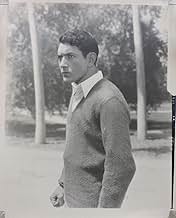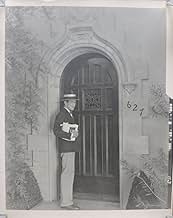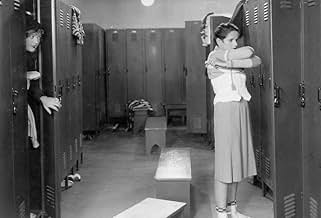Agrega una trama en tu idiomaMarion goes to college to pursue a handsome young man and discovers that he is coach of a women's basketball team.Marion goes to college to pursue a handsome young man and discovers that he is coach of a women's basketball team.Marion goes to college to pursue a handsome young man and discovers that he is coach of a women's basketball team.
- Dirección
- Guionistas
- Elenco
- Premios
- 1 premio ganado en total
Lenore Bushman
- Co-Ed
- (sin créditos)
Gordon Clifford
- Student
- (sin créditos)
Lou Costello
- Extra
- (sin créditos)
Mitzi Cummings
- Co-Ed
- (sin créditos)
Morley Drury
- Football Captain
- (sin créditos)
Dorothy Irving
- Co-Ed
- (sin créditos)
Katharine Irving
- Co-Ed
- (sin créditos)
Pepi Lederer
- Co-Ed
- (sin créditos)
Alona Marlowe
- Co-Ed
- (sin créditos)
Opiniones destacadas
The copy of this movie that I saw was in poor condition. It's about how Marion Davies goes to Bingham College because she has a yen for Johnny Mack Brown. He's coaching the woman's basketball team, so she shows up and proves to be the star player. But when Brown won't fall at her feet, she walks out of the team.
Will Marion develop a love for good old Alma Mater? Will she rejoin the team for the big game? Will she score the winning basket at the last moment? Will she and Brown end in a clinch? Will the movie have anything to do with academic pursuits? The answer to exactly one of those questions is "No" and I'm pretty sure you can guess which.
It's a potentially interesting gender-reversal comedy, with Miss Davies in competition for Brown's affections with Jane Winton, and women's basketball the big sport at the co-educational college Unfortunately, there isn't much in the way of farce, despite the source material being a George Ade play. Still, after her costume dramas, this must have been an inexpensive movie to shoot.
Listed extras include Joel McCrea, Jacques Tourneur, and Lou Costello. I doubt I could have identified any of them even if the copy had been better.
Will Marion develop a love for good old Alma Mater? Will she rejoin the team for the big game? Will she score the winning basket at the last moment? Will she and Brown end in a clinch? Will the movie have anything to do with academic pursuits? The answer to exactly one of those questions is "No" and I'm pretty sure you can guess which.
It's a potentially interesting gender-reversal comedy, with Miss Davies in competition for Brown's affections with Jane Winton, and women's basketball the big sport at the co-educational college Unfortunately, there isn't much in the way of farce, despite the source material being a George Ade play. Still, after her costume dramas, this must have been an inexpensive movie to shoot.
Listed extras include Joel McCrea, Jacques Tourneur, and Lou Costello. I doubt I could have identified any of them even if the copy had been better.
This is an old write-up based on a poor-quality copy of "The Fair Co-Ed" (so I'm not going to rate it), which has been circulating on the web and looks as though it were copied from an old VHS tape. Faces and the image in general appears bleached and non-intertitle writing within scenes (e.g. Letters and signs) were sometimes illegible as a result.
I haven't seen many of them thus far, but college-sports comedies seem to have been popular in the late silent era and age of early talkies. It was the Roaring Twenties, after all, and peace and prosperity led to increased college enrollment and an increase in the popularity of leisure activities such as sports. This one stars Marion Davies, who spends her freshman year at Bingham College chasing boys and playing basketball. Her academic record is addressed in only one punny title card regarding "passing." Get it--'cause basketball?
It was the times of Jack Dempsey, Red Grange, Walter Hagen, Babe Ruth, Bill Tilden and the horse, Man o' War. Besides the general reversal from the norm of these things, basketball, the subject of this film, wasn't yet a top-tier sport in terms of popularity. And, it's no wonder why after watching "The Fair Co-Ed." Personally, basketball is my favorite sport, but it was a very different game back in 1927. The jump shot hadn't been invented, let alone the NBA or WNBA, the shot clock, slam dunks or three-pointers. Instead, there were set shots, jump balls between every possession and more violence. Although not in the film, games were still sometimes played in cages. The knockabout humor here suites it. Besides the complete lack of any coherent plays (Coach Bob Dixon, the love interest of Marion, may be attractive, but he's a lousy coach), the film probably isn't that far off in its representation of the sport then.
Apparently, the students of Bingham take girls' hoops seriously, though. They throw a cultish pep rally, and the entire student body seems to turn against Marion when she quits the team. But, when she, of course, returns to help win a game, they celebrate with her again.
"The Fair Co-Ed" has most of the elements of the genre. Adults are grumpy, especially the dean, and they're always trying to dissuade the kids from having too much fun. There's dormitory and locker room gags, but nary a classroom to be seen. There's plenty of boys chasing girls, girls chasing boys, inappropriate relationships (i.e. Coach and student athlete) and general unruly behavior. A funeral service for their automobile license plates followed by a bizarre parade of various transportations employed by the students in response to the school's ban on the horseless carriage--also not that old of an invention at the time--is a highlight.
Additionally, the title cards were one of the reasons I watched this, as they were written by Joseph Farnham, who won the only Oscar for the category that year, although not for any specific picture. Anyways, they're plentiful here and provide much of the humor--full of snide insults, puns, slang and other wordplay. My favorite part, however, are the dialogue intertitles for a parrot.
I haven't seen many of them thus far, but college-sports comedies seem to have been popular in the late silent era and age of early talkies. It was the Roaring Twenties, after all, and peace and prosperity led to increased college enrollment and an increase in the popularity of leisure activities such as sports. This one stars Marion Davies, who spends her freshman year at Bingham College chasing boys and playing basketball. Her academic record is addressed in only one punny title card regarding "passing." Get it--'cause basketball?
It was the times of Jack Dempsey, Red Grange, Walter Hagen, Babe Ruth, Bill Tilden and the horse, Man o' War. Besides the general reversal from the norm of these things, basketball, the subject of this film, wasn't yet a top-tier sport in terms of popularity. And, it's no wonder why after watching "The Fair Co-Ed." Personally, basketball is my favorite sport, but it was a very different game back in 1927. The jump shot hadn't been invented, let alone the NBA or WNBA, the shot clock, slam dunks or three-pointers. Instead, there were set shots, jump balls between every possession and more violence. Although not in the film, games were still sometimes played in cages. The knockabout humor here suites it. Besides the complete lack of any coherent plays (Coach Bob Dixon, the love interest of Marion, may be attractive, but he's a lousy coach), the film probably isn't that far off in its representation of the sport then.
Apparently, the students of Bingham take girls' hoops seriously, though. They throw a cultish pep rally, and the entire student body seems to turn against Marion when she quits the team. But, when she, of course, returns to help win a game, they celebrate with her again.
"The Fair Co-Ed" has most of the elements of the genre. Adults are grumpy, especially the dean, and they're always trying to dissuade the kids from having too much fun. There's dormitory and locker room gags, but nary a classroom to be seen. There's plenty of boys chasing girls, girls chasing boys, inappropriate relationships (i.e. Coach and student athlete) and general unruly behavior. A funeral service for their automobile license plates followed by a bizarre parade of various transportations employed by the students in response to the school's ban on the horseless carriage--also not that old of an invention at the time--is a highlight.
Additionally, the title cards were one of the reasons I watched this, as they were written by Joseph Farnham, who won the only Oscar for the category that year, although not for any specific picture. Anyways, they're plentiful here and provide much of the humor--full of snide insults, puns, slang and other wordplay. My favorite part, however, are the dialogue intertitles for a parrot.
Another terrific comedy for Marion Davies. Interesting plot has Davies go off to college where she joins the basketball team to be near the coach, Johnny Mack Brown. She instantly makes a rival of Jane Winton, who's also interested in Brown. Davies (in a William Haines sort of role) refuses to play with Winton and after being chided quits the team rather than play with Winton.
The team begins to lose, to the delight of Davies, and as the "big game" approaches she hears the students razzing her at a pep rally. Davies swallows her pride and re-joins the team but the girls won't play with her. During the half-time Brown tries to get the girls to make up. Davies admits she's been a cluck and all is forgiven.
Interesting role-reversal for 1927 with the women's basketball team seemingly the idol of the co-ed campus (no men's team is mentioned). Davies and Winton spar over the love interest (Brown). Davies does her usual great comedic work here but also has an incredibly physical role. That's really MARION DAVIES playing basketball: running, shooting baskets, reaching for toss-ups. Very impressive and very funny film.
Thelma Hill plays Rosie, Lillian Leighton the dorm mother. Among the students are Joel McCrea (as the jerk in the bleachers) and of all people, Lou Costello, who can be glimpsed a few times wearing a beanie.
The team begins to lose, to the delight of Davies, and as the "big game" approaches she hears the students razzing her at a pep rally. Davies swallows her pride and re-joins the team but the girls won't play with her. During the half-time Brown tries to get the girls to make up. Davies admits she's been a cluck and all is forgiven.
Interesting role-reversal for 1927 with the women's basketball team seemingly the idol of the co-ed campus (no men's team is mentioned). Davies and Winton spar over the love interest (Brown). Davies does her usual great comedic work here but also has an incredibly physical role. That's really MARION DAVIES playing basketball: running, shooting baskets, reaching for toss-ups. Very impressive and very funny film.
Thelma Hill plays Rosie, Lillian Leighton the dorm mother. Among the students are Joel McCrea (as the jerk in the bleachers) and of all people, Lou Costello, who can be glimpsed a few times wearing a beanie.
Marion Davies is a young woman who goes to college to chase Johnny Mack Brown, a student. Finding that he is women's basketball coach, she joins the team and becomes the teams star, but quits the team to avoid co-operating with Jane Winton, who is Johnny's current beau.
Many fun scenes, especially the students returning to campus in protest of the college's no auto policy. Marion Davies gets most of the screen time and does very well.
Many fun scenes, especially the students returning to campus in protest of the college's no auto policy. Marion Davies gets most of the screen time and does very well.
¿Sabías que…?
- TriviaThe original Broadway production of "The Fair Co-Ed" by George Ade opened at the Knickerbocker Theater on February 1, 1909 and ran for 136 performances.
- ErroresDuring the opening credits, as the writing credits (second panel) are displayed, somebody wearing a hat ducked down and walked in front of the camera. (This may have been a common practice at the time.) But the person did not duck down far enough, and the top of the hat is just visible as it moves from left to right across the bottom edge of the frame.
Selecciones populares
Inicia sesión para calificar y agrega a la lista de videos para obtener recomendaciones personalizadas
Detalles
Taquilla
- Total en EE. UU. y Canadá
- GBP 485,300
- Tiempo de ejecución1 hora 11 minutos
- Color
- Mezcla de sonido
- Relación de aspecto
- 1.33 : 1
Contribuir a esta página
Sugiere una edición o agrega el contenido que falta

Principales brechas de datos
By what name was The Fair Co-Ed (1927) officially released in Canada in English?
Responda






























